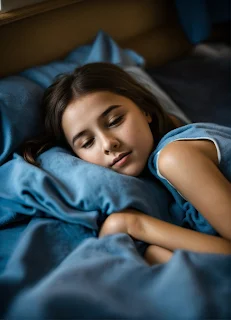OUR HEALTH AND SLEEP QUALITY
Sleep Smarter, Age Better: The Key to prevent Premature Aging and Hair Thinning
In today's fast-paced world, where schedules are packed and stress levels are high, prioritizing quality sleep often takes a backseat. However, emerging research suggests that sleep plays a crucial role not only in our overall health but also in maintaining youthful vitality and preventing common signs of aging, including hair thinning. In this article, we delve into the science behind the connection between sleep, premature aging, and hair health, offering insights into how optimizing sleep habits can lead to a healthier, more youthful appearance.
Understanding the Sleep-Aging Connection: Sleep is often referred to as the body's natural rejuvenator, and for good reason. During sleep, the body undergoes a myriad of essential processes, including cellular repair, hormone regulation, and toxin removal. One of the key players in this nightly restoration process is growth hormone (GH). GH, often dubbed the "youth hormone," is primarily secreted during deep sleep stages, particularly during the first few hours of sleep. This hormone plays a
crucial role in tissue repair, muscle growth, and overall rejuvenation.Moreover, adequate sleep is essential for maintaining a healthy balance of cortisol, often referred to as the stress hormone. When cortisol levels remain elevated due to chronic sleep deprivation or poor sleep quality, it can lead to a cascade of negative effects on the body, including accelerated aging and increased susceptibility to various health issues.The Impact of Sleep on Skin Health: One of the most visible signs of aging is changes in skin appearance and elasticity. Research has shown that insufficient sleep can lead to the breakdown of collagen and elastin, two proteins essential for maintaining skin firmness and elasticity. Additionally, chronic sleep deprivation can impair the skin's ability to repair itself from environmental damage, such as UV radiation and pollution, leading to
premature aging signs like wrinkles, fine lines, and sagging skin.Furthermore, inadequate sleep disrupts the skin's natural moisture barrier, leading to dryness, dullness, and an increased risk of developing skin conditions like eczema and psoriasis. Over time, these effects can contribute to an aged appearance and diminished overall skin health.The Link Between Sleep and Hair Thinning: While it may seem unrelated, the quality of our sleep can also impact the health of our hair. Hair follicles are highly sensitive to changes in hormonal balance and stress levels, both of which can be influenced by sleep patterns. As mentioned earlier, growth hormone, which is primarily secreted during deep sleep, plays a vital role in hair growth and maintenance. Insufficient sleep or disrupted sleep patterns can disrupt the body's natural production of growth hormone, potentially leading to hair thinning and loss over time.Moreover, chronic sleep deprivation can trigger an increase in cortisol levels, which can contribute to
inflammation and oxidative stress in the scalp. This, in turn, can disrupt the hair growth cycle and lead to conditions such as telogen effluvium, where hair prematurely enters the resting phase and sheds more than usual.Tips for Improving Sleep Quality and Preventing Premature Aging: Now that we understand the critical role of sleep in preventing premature aging and hair thinning, let's explore some practical strategies for improving sleep quality and optimizing overall health:
1.Establish a Consistent Sleep Schedule: Aim to go to bed and wake up at the same time every day, even on weekends. This helps regulate your body's internal clock and promotes better sleep quality.
2.Create a Relaxing Bedtime Routine: Engage in calming activities before bed, such as reading, practicing relaxation techniques like deep breathing or meditation, or taking a warm bath. Avoid stimulating activities or screens that emit blue light, which can interfere with melatonin production.
3.Optimize Your Sleep Environment: Make sure your bedroom is conducive to sleep by keeping it cool, dark, and quiet. Invest in a comfortable mattress and pillows that support proper spinal alignment.
4.Limit Stimulants and Alcohol: Avoid consuming caffeine and alcohol close to bedtime, as they can disrupt sleep patterns and inhibit restorative sleep.
5.Prioritize Stress Management: Incorporate stress-reducing practices into your daily routine, such as exercise, yoga, or spending time outdoors. Additionally, consider seeking support from a therapist or counselor if stress is impacting your sleep and overall well-being.
6.Practice Healthy Sleep Hygiene: Avoid engaging in stimulating activities, such as working or watching TV, in bed. Reserve your bed for sleep and intimacy only to strengthen the association between your bed and sleep.
Please do remember that ,sleep plays a vital role in maintaining youthful vitality and preventing premature aging and hair thinning. By prioritizing quality sleep and adopting healthy sleep habits, we can support our body's natural rejuvenation processes, promote skin and hair health, and preserve a more youthful appearance as we age. Remember, sleep smarter, age better – invest in your sleep for a healthier and more vibrant future.
Thanks for reading,
Have a nice day.😊













Comments
Post a Comment